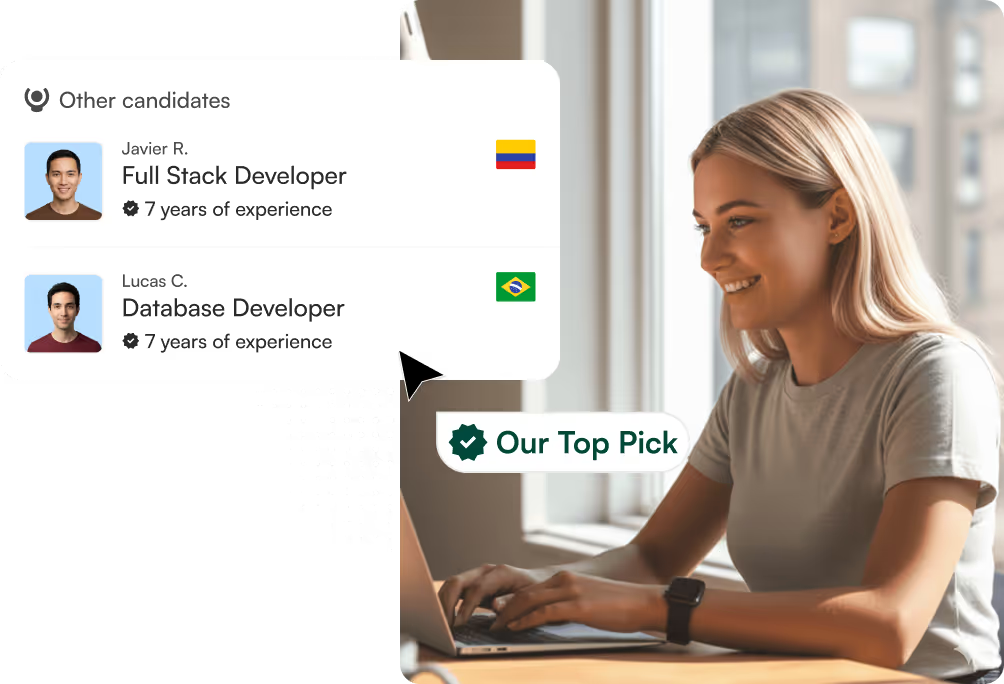25 Second Interview Questions to Prepare For (Both Sides of the Table)


Lupa will help you hire top talent in Latin America.
Book a Free Consultation
Lupa helps you build, manage, and pay your remote team. We deliver pre-vetted candidates within a week!
Book a Free ConsultationCongratulations! You've made it past the first interview and have been invited back for a second round. This is a critical juncture in the hiring process where companies narrow down their best candidates, and the stakes are higher for everyone involved. Second interview questions typically dig deeper than those in the initial screening, with more senior staff participating and greater scrutiny of your cultural fit and specific qualifications.
Understanding the Purpose of Second Interviews
Second job interviews serve distinct strategic goals for both employers and candidates. For companies, this stage is about making final decisions after narrowing down their candidate pool. The first interview typically screens for basic qualifications and initial impressions, while the second interview questions delve into specifics about experience, cultural fit, and long-term potential.
For candidates, the second interview presents an opportunity to gain deeper insights into the role, team dynamics, and company culture. It's your chance to evaluate whether this position truly aligns with your career goals and work preferences.
Second interviews may take different formats:
- In-person interviews: These allow for face-to-face interaction and office tours, giving candidates a feel for the physical work environment.
- Remote interviews: Increasingly common, these may involve multiple interviewers in succession or panel interviews via video conferencing.
- Hybrid approaches: Some companies combine elements, perhaps starting with virtual meetings and an in-person follow up for the final round.
Each format requires slightly different preparation, but the core purpose remains the same: determining mutual fit at a deeper level than the initial screening.
How to Prepare for a Second Interview
Thorough preparation is essential for making a strong impression during your second interview. Here's a comprehensive approach to get ready:
- Analyze your first interview performance: Reflect on questions that seemed particularly important or areas where you could improve your responses. Note any topics the interviewer emphasized or seemed concerned about.
- Research the company more deeply: Go beyond basic information to understand recent developments, challenges, and opportunities. Review the company's LinkedIn profile, recent news, and industry position.
- Review the job description again: Identify specific skills and experiences you should highlight based on the role's requirements. Connect your background directly to what they're seeking.
- Prepare thoughtful questions: Develop questions that demonstrate your interest in the role and company. Focus on team dynamics, success metrics, and growth opportunities.
- Practice responses to likely second interview questions: Use the STAR method (Situation, Task, Action, Result) to structure answers about your experience and accomplishments.
- Remember names and details: Make note of your first-round interviewers' names and key points from those conversations. Referencing these details shows attentiveness and genuine interest.
- Prepare specific examples of relevant accomplishments: Have specific stories ready that demonstrate your skills and how you've handled situations similar to what you might face in this role.
- Research your interviewers: If you know who you'll be meeting, review their LinkedIn profiles to understand their roles and backgrounds. This can help you tailor your responses and questions.
Top 25 Common Second Interview Questions
Questions About Career Goals and Aspirations
1. What are your long-term career goals?
This question assesses whether your career ambitions align with the company's growth trajectory and opportunities. Hiring managers use it to evaluate your potential for retention and advancement.
Sample Answer: "My long-term career goal is to develop into a strategic marketing leader who can drive in-depth business growth through innovative campaigns and team development. I'm looking for a company where I can grow my skills in digital marketing analytics and eventually lead a marketing department. From researching your organization, I see that you invest in employee development and promote from within, which aligns perfectly with my desire to build a long-term career in an organization where I can make a meaningful impact."
2. Where do you see yourself in 5-10 years?
This second interview question evaluates your career planning and ambition. Companies want to understand if your vision aligns with their potential growth paths and whether they can provide the opportunities you seek.
Sample Answer: "In five years, I hope to have mastered this role and taken on additional responsibilities that allow me to mentor junior team members. By ten years, I aim to be in a senior management position where I can contribute to strategic decision-making while leading a high-performing team. I'm particularly drawn to your company because your growth trajectory suggests these opportunities will be available, and your leadership development program would help me build the skills needed for that path."
3. What would be your ideal next role after this position?
This question reveals whether you see the company as a long-term home or merely a stepping stone. It helps employers gauge your understanding of their organizational structure and potential career paths.
Sample Answer: "After establishing a strong foundation in this role and contributing significantly to the team's success, I'd be interested in growing into a position with more strategic planning responsibilities. Based on my research of your company structure, a logical progression might be toward a senior specialist or team lead role where I could leverage my experience while developing leadership skills. I'm excited about this potential path because it aligns with both my strengths and aspirations while allowing me to continue adding value to the organization."
Questions About Company Knowledge and Fit
4. What questions have come up for you since the first interview?
This question tests your preparation, engagement, and thoughtfulness since the initial meeting. It reveals whether you've been reflecting on the role and researching the company further.
Sample Answer: "Since our first conversation, I've been thinking about the cross-functional collaboration you mentioned. I'm curious about how the marketing and product teams coordinate on new launches. Additionally, I noticed your company recently announced a new initiative in sustainable practices. I'd love to understand how that might influence the projects I'd be working on in this role."
5. What suggestions would you make to improve our company?
This second interview question tests your company research and ability to provide constructive feedback tactfully. It reveals your strategic thinking and how you might contribute to the organization's growth.
Sample Answer: "Based on my research and our previous discussions, I've noticed your company has an impressive product lineup but might benefit from more integrated content marketing across channels. One opportunity might be creating more customer success stories that highlight specific use cases, which could help prospects better understand your solutions' real-world applications. I've implemented similar strategies in my current role, resulting in a 15% increase in qualified leads."
6. Why are you the best fit for this role?
This question requires you to summarize your value proposition concisely, connecting your specific experiences and skillset to the job requirements while demonstrating cultural fit.
Sample Answer: "I believe I'm an excellent fit for this role because my five years of experience in developing scalable software solutions directly addresses your need for someone who can optimize your current systems. In my previous position, I reduced processing time by 30% through strategic refactoring, similar to the challenges you've described. Beyond technical skills, my collaborative approach to problem-solving skills aligns with your team-oriented culture. I'm genuinely excited about your mission to make financial services more accessible, which would make coming to work meaningful every day."
Questions About Work Style and Preferences
7. What type of work environment do you prefer?
This second interview question assesses cultural fit and work style compatibility. Employers want to know if you'll thrive in their particular setting, whether it's highly collaborative, independent, structured, or flexible.
Sample Answer: "I thrive in collaborative environments where team members openly share ideas while still having the autonomy to own their projects. I appreciate regular feedback and clear expectations, but also value the flexibility to approach problems creatively. From what I've gathered about your company culture, it seems to balance teamwork with individual accountability, which aligns perfectly with how I work best. Could you tell me more about how your team specifically approaches collaboration and independent work?"
8. What management style works best for you?
This question evaluates how you like to be led and whether you'll thrive under the company's leadership approach. It helps determine if there's a match between your preferences and their management philosophy.
Sample Answer: "I work best with managers who provide clear expectations and regular feedback while trusting me to execute my responsibilities without micromanagement. I appreciate leaders who are accessible for questions and guidance but encourage problem-solving and initiative. I've found this balance of support and autonomy helps me grow professionally while delivering strong results. In my conversation with the team lead last week, it seemed this aligns with how your department operates. Is that accurate?"
9. How do you help others succeed at work?
This question assesses your teamwork capabilities and leadership potential, revealing whether you'll contribute positively to team dynamics and support colleagues' growth.
Sample Answer: "I believe in both formal and informal ways of supporting team success. Formally, I've mentored two junior colleagues in my current role, creating learning plans and providing regular feedback that helped them advance to mid-level positions. Informally, I make myself available as a resource, freely sharing knowledge and best practices. For example, when a colleague struggled with a complex data analysis project, I offered to review their approach and suggested an alternative methodology that ultimately saved them significant time. I find that a rising tide lifts all boats, and team success ultimately leads to better outcomes for everyone."
Questions About Skills and Experience
10. What specific skills do you believe are most important for this role?
This second interview question tests your understanding of the position and how well you've aligned your capabilities with its requirements. It reveals whether you grasp the core functions and priorities of the role.
Sample Answer: "Based on our discussions and the job description, I believe this role requires strong analytical skills to interpret market data, strategic thinking to develop effective campaigns, and excellent communication abilities to collaborate across departments. My experience conducting market segmentation analysis at my current company has honed my analytical skills, while leading cross-functional projects has strengthened my strategic planning and communication capabilities. I'm particularly interested in how you balance data-driven decisions with creative marketing approaches in your team."
11. Tell me about the first things you would do in this role
This question evaluates your strategic thinking and prioritization skills, showing how you approach new challenges and whether you have a thoughtful plan for onboarding.
Sample Answer: "In my first 30 days, I would focus on understanding your current systems, processes, and team dynamics through meetings with key stakeholders and reviewing existing documentation. During days 30-60, I would identify quick wins and begin implementing improvements while developing deeper relationships with cross-functional partners. By days 60-90, I would have formulated a comprehensive strategy for longer-term initiatives based on business priorities and team input. Throughout this process, I'd ensure regular check-ins with my manager to align on expectations and adjust my approach as needed. This methodical onboarding has worked well for me in previous roles, allowing me to contribute value quickly while building a foundation for long-term success."
12. What was your biggest impact at your previous job?
This second interview question assesses your actual contributions and value creation in past roles, helping employers understand the concrete results you might deliver for them.
Sample Answer: "My most significant impact was redesigning our customer onboarding process, which reduced time-to-value from 14 days to just 3 days. I identified bottlenecks through customer interviews and workflow analysis, then led a cross-functional team to implement streamlined solutions. This improvement increased customer satisfaction scores by 27% and reduced support tickets by 35% in the first quarter after implementation. The project required both technical expertise to optimize systems and leadership skills to align multiple departments around a common goal—capabilities I'm excited to bring to this position."
Questions About Problem-Solving and Challenges
13. Tell me about a time you experienced conflict at work
This question evaluates your conflict resolution skills and emotional intelligence, revealing how you handle interpersonal challenges in professional settings.
Sample Answer: "In my previous role, I disagreed with a senior colleague about the approach to a critical client project. The situation was tense because we had different perspectives on resource allocation and timeline feasibility. I requested a private meeting where I first listened to understand his concerns fully. Then, I presented data supporting my position while acknowledging the validity of his experience. We ultimately developed a hybrid approach that incorporated the best elements of both our ideas. The project was completed successfully, and our working relationship actually strengthened through the process. This experience taught me the importance of addressing conflicts directly but respectfully, and the value of finding common ground even in disagreement."
14. What might make you unsuitable for this position?
This second interview question evaluates your self-awareness and honesty. It reveals whether you can realistically assess your limitations while demonstrating a growth mindset.
Sample Answer: "While I have extensive experience with most aspects of this role, I have less exposure to the enterprise-level CRM systems you mentioned using. However, I've consistently demonstrated the ability to quickly learn new technologies throughout my career. In my current position, I mastered our proprietary database system within three weeks despite no prior experience with similar platforms. I've already begun researching your CRM system and would prioritize becoming proficient with it during my onboarding. I believe my strong analytical foundation and adaptability would allow me to overcome this learning curve efficiently."
15. How do you learn from repeated failures?
This question assesses your resilience and growth mindset, showing how you handle setbacks and whether you can extract valuable lessons from difficult experiences.
Sample Answer: "I approach repeated failures as data points rather than defeats. For example, when leading a website optimization project, our first three approaches didn't yield the conversion improvements we expected. Instead of becoming discouraged, I implemented a structured analysis after each attempt, documenting what we learned and refining our hypotheses. I also sought input from colleagues with different perspectives. By the fourth iteration, we identified the underlying user behavior pattern we had missed and increased conversions by 23%. This experience reinforced my belief that persistence combined with systematic learning and collaboration is the key to overcoming complex challenges."
Questions About Motivation and Interests
16. What's missing in your current job?
This second interview question reveals your motivations for leaving and potential satisfaction factors in a new role. It helps employers understand what drives your job search and whether they can meet your needs.
Sample Answer: "While I've valued the technical experience and collaborative team at my current company, I'm seeking more opportunities for strategic input and professional growth. In my present role, decisions about product direction are made at levels I don't have access to, limiting my ability to contribute ideas based on my customer insights. I'm drawn to this job offer because, from our discussions, it appears to involve more strategic planning and direct impact on product development. I'm also excited about your company's formal mentorship program and clear advancement paths, which align with my goal of continuing to develop my leadership skills."
17. How are you motivated at work?
This question assesses what drives your performance and engagement, helping employers understand how to bring out your best work and whether their environment will energize you.
Sample Answer: "I'm primarily motivated by solving complex problems that make a meaningful difference for users or customers. Seeing the direct impact of my work on improving someone's experience or efficiency gives me tremendous satisfaction. I also thrive when learning new skills and technologies, which is why your company's innovation focus appeals to me. Additionally, I'm motivated by collaborative environments where ideas are valued regardless of hierarchy. During my conversation with your team members last week, I was impressed by how they described the collaborative problem-solving culture here, which seems like an excellent fit for how I work best."
18. Why are you interested in our industry?
This second interview question evaluates your genuine interest versus paycheck motivation, revealing whether you're likely to remain engaged and committed long-term.
Sample Answer: "I'm passionate about the healthcare technology industry because it combines cutting-edge innovation with tangible human impact. My interest began during a college internship where I saw firsthand how digital solutions improved patient outcomes. Since then, I've followed industry developments closely, particularly the evolution of remote monitoring technologies and AI diagnostics. I'm especially drawn to your company's focus on increasing healthcare accessibility through affordable technology solutions. The work you're doing to bridge healthcare gaps in underserved communities resonates with my personal values, and I'm excited about potentially contributing to such meaningful innovation."
Practical and Logistical Questions
19. What are your salary expectations?
This question manages compensation expectations and opens negotiation. It helps employers determine if there's alignment on compensation before proceeding further.
Sample Answer: "Based on my research of similar roles in this market and my experience level, I'm looking for a salary in the range of $85,000 to $95,000. However, I consider the entire compensation package, including benefits, growth opportunities, and work-life balance. I'm open to discussion as I learn more about the specific responsibilities and how my experience aligns with your needs. Could you share the typical range you've budgeted for this position?"
20. What is your availability to start?
This second interview question addresses logistical planning and professionalism regarding notice periods. It helps employers understand your timeline and commitment to proper transitions.
Sample Answer: "I would need to give my current employer two weeks' notice as a professional courtesy, though I could potentially extend that slightly if needed for a comprehensive handover of my projects. I have no other commitments that would delay my start date beyond that notice period. I'm excited about the possibility of joining your team and would be eager to begin as soon as possible after fulfilling my current obligations. Is there a particular timeline you're working with for bringing someone onboard?"
21. How is your job search progressing?
This question identifies competition and determines the urgency of hiring decisions. It helps employers gauge your interest level and whether they need to expedite their process.
Sample Answer: "I'm in the middle stages of my job search, focusing on opportunities that align with my career goals rather than applying broadly. I'm currently in second-round interviews with two other companies, but this position is particularly appealing because it aligns so well with my interest in data-driven marketing and collaborative team environments. While I'm being thorough in my search, I'm most excited about the potential to join your organization based on our conversations so far and what I've learned about the role and company culture."
Creative and Behavioral Interview Questions
22. Describe yourself in one sentence
This second interview question tests self-awareness and communication skills. It reveals your ability to distill complex information and prioritize what matters most about your professional identity.
Sample Answer: "I'm a results-oriented problem solver who combines analytical thinking with creative approaches to develop solutions that exceed expectations while building strong collaborative relationships."
23. What changes would you make if you were managing your current team?
This question evaluates leadership thinking and tact, showing how you balance constructive ideas with respect for current management and whether you can identify improvements diplomatically.
Sample Answer: "While my current team is strong in technical execution, I believe we could benefit from more structured knowledge sharing across specialties. If I were managing the team, I'd implement bi-weekly skill exchange sessions where team members could teach others about their areas of expertise. This would improve our versatility and reduce bottlenecks when specific team members are unavailable. I'd also create more opportunities for junior team members to lead smaller projects with mentorship, something I've found valuable in my own development. These additions would build on the solid foundation already in place while addressing opportunities for growth I've observed."
24. What was the last movie that made you emotional?
This question assesses personality and company values in a less formal context. It helps employers understand your human side and how you might be a good fit into the team culture.
Sample Answer: "The documentary 'Free Solo' about rock climber Alex Honnold really moved me. Beyond the incredible athletic achievement, I was struck by his methodical preparation and unwavering focus. The film explores the balance between pursuing excellence and managing risk, which resonated with me professionally. I appreciate how he broke down a seemingly impossible goal into manageable components and prepared thoroughly for every scenario—an approach I try to apply to complex projects in my work. It also prompted reflection on how we balance professional ambitions with personal relationships, which I think is relevant to maintaining sustainable high performance in any field."
25. What questions should I have asked you but didn't?
This second interview question tests self-awareness and communication initiative. It reveals whether you can identify important qualifications or experiences that might have been overlooked.
Sample Answer: "You might want to ask about my experience leading remote teams, as I noticed your job description mentioned collaboration across multiple offices. In my previous role, I managed a team split between three different time zones, implementing communication protocols and project management tools that increased productivity by 20% despite the distance. I developed specific strategies for maintaining team cohesion and ensuring equitable participation from all team members regardless of location, which could be relevant to how your organization navigates hybrid work environments."
Second-Round Interview Questions Candidates Should Ask
Asking thoughtful questions demonstrates your interest, preparation, and strategic thinking. Here are some of the best questions to consider asking during your second interview:
- Team dynamics: "Can you tell me more about the team I'd be working with? What are their strengths and how do they collaborate?"
- Success metrics: "How will my performance be measured in the first six months? What would success look like in this role?"
- Challenges: "What are the biggest challenges facing the team/department right now, and how would this role contribute to addressing them?"
- Day-to-day responsibilities: "Could you walk me through what a typical day might look like in this position?"
- Growth opportunities: "How do you support professional development and career advancement for someone in this role?"
- Company culture: "What aspects of the company culture do you value most, and how are they reflected in daily operations?"
- Decision-making processes: "How are decisions typically made on this team? Can you give me an example of a recent decision and how the process worked?"
- Manager's expectations: "What is your management style, and what expectations do you have for the person in this role?"
- Current priorities: "What are the most immediate projects or initiatives that need attention from the person in this position?"
- Next steps: "What are the next steps in the interview process, and what is your timeline for making a decision?"
Remember to tailor these questions based on what you've already learned about the company and role. Avoid asking questions that could be easily answered through basic research or that were already addressed in previous conversations.
Ready to elevate your hiring process with premium talent?
Finding the right candidates who can excel in second interviews requires a strategic approach to recruiting. At Lupa, we specialize in connecting US companies with top-tier Latin American talent who are fully aligned on timezone, culture, and communication skills.
Unlike traditional recruiters focused on volume, we prioritize quality matches through our human, strategic approach. Our team reflects the premium talent we place, with deep cultural understanding that bridges any gaps between US companies and Latin American professionals.
Book a discovery call today to learn how Lupa can transform your hiring process with candidates who don't just check technical boxes but truly elevate your team.

"Over the course of 2024, we successfully hired 9 exceptional team members through Lupa, spanning mid-level to senior roles. The quality of talent has been outstanding, and we’ve been able to achieve payroll cost savings while bringing great professionals onto our team. We're very happy with the consultation and attention they've provided us."


“We needed to scale a new team quickly - with top talent. Lupa helped us build a great process, delivered great candidates quickly, and had impeccable service”


“With Lupa, we rebuilt our entire tech team in less than a month. We’re spending half as much on talent. Ten out of ten”






















